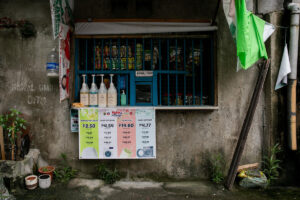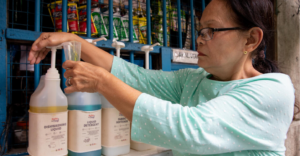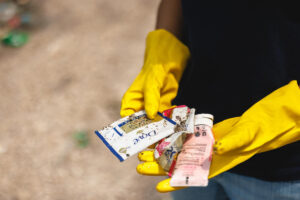Aside from being a key solution to the plastics pollution crisis, large-scale investment in reuse and refill systems is better for consumers and retailers, data from a new report shows.
The report, Kuha sa Tingi: Bringing back sustainability into Filipino tingi culture, was published by Greenpeace Philippines and was launched in Quezon City. It presents the successes of the “Kuha sa Tingi” project that seeks to replace single-use plastics with refill systems as a means to mitigate plastic pollution across the plastic lifecycle, while revitalizing the ethos of the Filipino tingi culture.

A small store that participated in the “Kuha Sa Tingi” or KST program is seen in Barangay Maytunas in San Juan City, Metro Manila, Philippines. November 21, 2022. “Kuha Sa Tingi”, a project initiated by Greenpeace Philippines in collaboration with local governments and partner organizations, aims to reduce sachet use or single use plastics in communities by rethinking business models and implementing a refill and reuse system into the operations of community-based stores.
Pioneered by Greenpeace Philippines, RIPPLEx, and the local governments of San Juan City and Quezon City in 2023, the Kuha sa Tingi project introduced small-portion refill systems for personal and home care products in city sari-sari stores at highly competitive price points.
Proponents believe that the project is proof-of-concept that reuse and refill systems are not just effective solutions to the plastic crisis, but are also sound business models that benefit suppliers, retailers, consumers, and local government units—while helping protect the environment and communities.
The scourge of sachet pollution by manufacturers is one of the main drivers of plastic pollution in the country. However, sachet production remains largely unregulated, highlighting the urgent need for alternative solutions as well as comprehensive policies to address this problem.
“This report proves that sachet pollution will be a thing of the past when reuse and refill systems are adopted at scale,” said Marian Ledesma, Greenpeace Philippines Zero Waste Campaigner.

Celia Ponesto, a store owner, refills a plastic container with diswashing liquid as part of the “Kuha Sa Tingi” or KST program in Barangay Maytunas in San Juan City, Metro Manila, Philippines. November 21, 2022. “Kuha Sa Tingi”, a project initiated by Greenpeace Philippines in collaboration with local governments and partner organizations, aims to reduce sachet use or single use plastics in communities by rethinking business models and implementing a refill and reuse system into the operations of community-based stores.
“The government must drive major investment into these solutions while instituting strong policies to regulate and eliminate single-use plastics. With political will, as seen in Quezon City and San Juan City, these models can be effectively replicated and scaled up, and will provide benefits to citizens and the local government unit by reducing sachet pollution, material resource usage, and greenhouse gas emissions. In doing so, they subsequently decrease the harms felt by affected communities throughout the lifecycle of plastic.“
“Aside from selling products as refills, through this project, I learned that plastic waste has become a large problem in society. Every time we buy sachets, we merely throw them anywhere. If we purchase refills, we will be able to avoid plastic waste altogether,” said Narciso Marcelo, a sari-sari store owner from Brgy. West Crame, San Juan City.
According to the report, Kuha sa Tingi displaced more than 50,000 sachets during the pilot periods in San Juan City and Quezon City. During the same period, consumers experienced average savings of 201% when opting for refills over sachets.
Moreover, participating sari-sari store owners reported an average 15% increase in profit, with some even discontinuing the sale of dishwashing liquid in sachets due to either decreased demand or improved profitability.

Marian Ledesma from Greenpeace Philippines picks up pieces of plastic trash from the company Dove around Freedom Island at Las Pinas, Philippines. This wetland part of Manila bay called Las Piñas – Parañaque Critical Habitat and Ecotourism Area (LPPCHEA) is a 175 hectare protected area. It is always filled with plastic trash that comes from the ocean. The amount of plastic trash here does not stop even with the continuous shore clean up by various groups.
Mayor Francis Zamora of San Juan City said, “Kuha sa Tingi has proven to be an effective program in San Juan City to lower the use of single-use plastic, increase environmental awareness, and provide livelihood to our constituents. I would like to thank Greenpeace and RippleX for making this possible in the city. We hope to replicate this in other areas in the city and Metro Manila.”
Mayor Joy Belmonte of Quezon City, said: “While Quezon City targets the reduction of its solid waste generation by 50% in 2030, sachet waste that clogs our waterways and drainage systems demands immediate action. Innovative programs like Kuha sa Tingi tackle this challenge head-on. By transforming sari-sari stores into refill hubs for everyday essentials such as liquid detergent, fabric conditioner, multi-purpose cleaner, and dishwashing liquid, we are empowering our residents to embrace a sustainable lifestyle by choosing reusable options, creating a win-win solution that protects our environment, saves money for our residents, and increases income for store owners.”
Ces Rondario, CEO & Founder of RIPPLEx, said: “The incredible response from cities looking to adopt #KuhaSaTingi showcases a growing desire for practical solutions. RIPPLEx is proud to be a part of this movement and offer a model that provides an economic response in achieving community well-being alongside environmental sustainability.”
The report recommends that:
- The Philippine government ensures a strong regulatory framework that addresses plastic pollution at the root by looking at the complete lifecycle of plastics, instead of just focusing on waste management.
- Alongside existing measures such as the local government ordinances, and the Ecological Solid Waste Management Act, the government should mandate, and provide strong support for, reuse and refill systems.
- The EPR Act should be revised and strengthened to change its focus from plastic waste recovery and disposal to the reduction of plastic production in order to make it an effective law.
- Corporations must change the way they do business and enact widespread systemic changes on what materials they rely on, as well as on their product delivery systems. To begin with, they need to start phasing out sachet packaging, and then drastically reduce and eventually eliminate the production of disposable plastic packaging and products.
The report concludes that accelerating the transition to reuse and refill systems, as well as reducing and eventually eliminating the production of single-use disposable plastic products and packaging will secure environmental justice, contribute to better health outcomes, advance climate action, and protect the well-being of every Filipino




